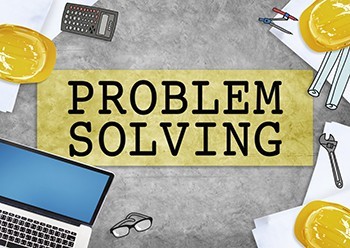Service owners are responsible for understanding the full breadth of a service offering including how the service is being provided and how it is being used to ensure cost, performance, availability and SLAs all meet the organizations expectations. In order to be successful, service owners consume a large amount of data from a variety of sources, organize the data into information, distill out actionable insights and make recommendations on what changes need to be made to make the service better. This can be a daunting task, even for a seasoned ITSM professional but there is one skill that can help him/her be successful. – problem solving. Here are 5 reasons why problem solving is an essential skill for Service Owners:
- Problem solving is about teamwork – Service Owners know that managing a service isn’t an individual sport, it requires a coordinated team effort. Problem Solving skills can help the Service Owner understand who needs to be involved in collecting information, analyzing it, developing recommendations, making decisions and taking action. Each of these stakeholders will have their own perspective, needs, abilities and constraints. Through the skills of problem solving, the Service Owner will be to better coordinate the efforts of the team.
- Problem solving is about filtering out the noise and understanding what is important – Service management creates a lot of data. Often the data is incomplete, duplicated or conflicting – but what is even more important for the Service Owner to understand is that most of the data that is created is irrelevant to the problems that need to be solved and the decisions that need to be made. Problem solving skills can help the Service owner filter out the irrelevant data and focus in on the information that is both relevant and actionable.
- Problem solving is about understanding cause and effect – Services are not static things, they are evolving entities, continually adapting to forces in their environment. These forces may be from dependencies, consumption behavior, changes, incidents, events and even changing business needs. It is the job of the Service Owner to understand how these forces impact the service and how the service can impact the environment. The diagnosis methodologies that are a part of problem solving can provide the Service Owner a tool for understanding these forces and their cause and effect relationships to make better informed decisions about their services.
- Problem solving is about prioritization – One of the core roles of a service owner is developing recommendations and/or making decisions about how a service operates and changes over time. Problem Solving can provide the Service Owner tools and methods for assessing and comparing alternatives against factors like time, resources, impact, likelihood of success and risk. These prioritization methods will help the Service Owner make better quality and more confident decisions.
- Problem solving is about creating value – There is a difference between “change” and “improvement” – that difference is value. Service Owners understand that every change introduced has the potential to create value but also the potential to create risk for the organization. Problem solving skills can help the Service Owner better understand the implications of different alternatives to ensure that service resources are applied as effectively and efficiently to maximize value and minimize risk.
About Kepner-Tregoe
At Kepner-Tregoe, we believe that the best service providers are the best problem solvers. For over 50 years we have been helping companies just like yours develop the problem solving skills to up-level their workforce and improve operational performance.








